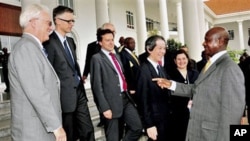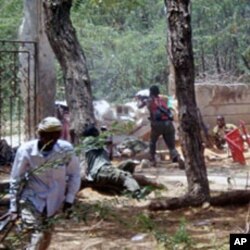Ugandan President Yoweri Museveni has repeated his willingness to send Ugandan troops to help stabilize Somalia. After a meeting Wednesday with the U.N. Security Council in Entebbe, President Museveni said he could raise as many troops as needed, but other countries must offer the financing and equipment for such an expanded peacekeeping force.
Two weeks ago in New York, on the margins of the U.N. General Assembly, African leaders said President Museveni had offered as many as 20,000 Ugandan troops to help bolster the African Union force in Somalia.
Asked about this Wednesday, Mr. Museveni did not give a specific number, but told reporters he is ready to send as many soldiers as needed.
"We can raise any number which our brothers and sisters ask us to raise. But they must bring the money and the equipment. We have the human beings, we have the experience, we have the training, but we cannot provide the money," said Museveni.
He suggested that some of the wealthier African nations such as South Africa, Algeria and Libya might be able to help foot the bill of such an expanded peacekeeping force.
President Museveni said sending troops to Somalia is an act of African solidarity.
The AU force in Somalia is currently over 7,000 strong but the African Union has said it wants to increase those levels to 20,000 to help stabilize the country which is under threat from insurgents and foreign fighters.
Uganda is a non-permanent member of the U.N. Security Council and holds the rotating presidency this month.
The Security Council is in the region this week mainly to discuss Uganda's neighbor, Sudan, where a referendum on January 9 could likely see the southern part of the country secede from the north.
Ugandan U.N. Ambassador Ruhakana Rugunda said that the council's discussions with President Museveni focused on the full implementation of the Comprehensive Peace Agreement - the 2005 accord that ended Sudan's civil war and laid out the framework for the referendum.
Preparations for the vote are behind schedule and the council has come to urge the parties to fulfill their obligations under the CPA.
"Especially the rigorous implementation of the Comprehensive Peace Agreement - rigorous in the sense that the referendum should be free, should be fair and should be held on time, and that the international community should give it maximum support," said Ambassador Rugunda.
The Security Council is also scheduled to meet key players during visits this week to Juba in southern Sudan, El Fasher in the Darfur region and Khartoum.





